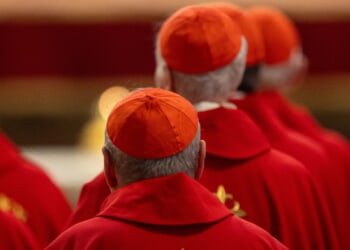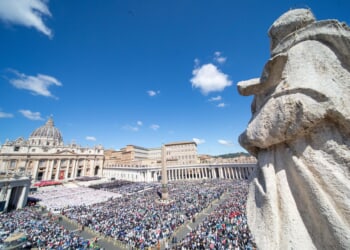Recently, the U.S. Department of Defense received a Boeing 747-8 jet from the government of Qatar, valued at $400 million. The plane is now in San Antonio, where it will undergo about $1 billion in upgrades to become the next Air Force One.
Although official statements have confirmed that the aircraft is not for Donald Trump’s personal use, some media reports have treated the gift as if it were. These articles describe it as an unusual and possibly unethical donation, ignoring both precedent and context. The truth, however, tells a completely different story.
The fixation over the Jet isn’t a debate over ethics — it’s a difference in how stories are told depending on the person involved.
The jet will eventually be moved to Trump’s presidential library in 2029 after its use as an official government plane. Despite this, Democrats are framing the story to suggest Trump is personally benefiting from foreign gifts — a claim that overlooks similar past examples involving other presidents.
This jet transfer fits into a much larger and long-standing pattern of deep financial ties between Qatar and various branches of the U.S. government — ties that existed long before Trump and have continued under Democratic and Republican administrations alike.
One major example is the Al Udeid Air Base, the largest American military facility in the Middle East, located in Qatar. Qatar has invested over $8 billion into the base, which has supported U.S. military operations in Iraq, Syria, and Afghanistan. In 2022, President Biden named Qatar a “Major Non-NATO Ally,” a status that strengthens military and diplomatic cooperation.
That same year, Qatar Airways signed a $20 billion deal with Boeing, a move praised by Biden for supporting over 35,000 American jobs. In 2019 alone, U.S. exports to Qatar hit $6.5 billion, with Qatar purchasing more than $3 billion worth of American military equipment, including Apache helicopters and air defense systems.
These examples show that Qatar has poured billions of dollars into U.S. interests. Yet when this latest donation happened under Trump, the media response was unusually negative. The double standard becomes clearer when compared to how other gifts received from Qatar have been treated in the past.
In 2011, the Clinton Foundation accepted a $1 million donation from Qatar while Hillary Clinton was serving as Secretary of State. That donation was not reported to the State Department, despite rules requiring such disclosures. Although the gift raised concerns, it received little media coverage and quickly faded from public view.
More recently, Qatar made a $5 million donation in 2023 to the Bob Woodruff Foundation, a group that supports veterans and has close ties to senior members of the Biden administration. There was no major outcry, and media outlets did not suggest the gift might reflect improper influence.
Qatar has also donated heavily to U.S. universities, giving over $4.7 billion from 2001 to 2021. Schools like Harvard, MIT, and Texas A&M have all received large amounts of money. These schools also partner with Qatar on joint research and academic programs. Yet this flow of foreign money into influential educational institutions rarely gets the same attention or criticism.
Such donations don’t just support education or the military — they also help Qatar build influence. Whether the money goes to a presidential foundation, a veterans group, or a research university, the goal is the same: to win favor and access. Qatar’s gifts are not unique to Trump, and pretending they are shows a bias that damages honest reporting.
Democrats argue that past presidents accepted support that helped the country, while this Qatari jet somehow benefits Trump personally. But that difference is not as clear as some suggest. If Qatar funds a military base, buys U.S. weapons, or donates to institutions connected to political figures, the purpose is still to gain influence. To say one is normal and the other is corrupt depending on who is president is misleading and unfair.
Criticism for Trump Only
The fixation over the Jet isn’t a debate over ethics — it’s a difference in how stories are told depending on the person involved. When journalists allow bias to shape the way they report on similar events, it confuses the public and lowers trust in the press.
If the concern is truly about foreign influence, then the full picture must be discussed. That includes every administration — Clinton, Obama, Biden, and Trump — that has accepted major donations or support from Qatar. If not, then the issue isn’t foreign money at all — it’s who the media wants to criticize. Ignoring some donations while attacking others only deepens division and weakens credibility. The American people deserve reporting based on facts — not selective outrage.
READ MORE from Gregory Lyakhov:
Even Democrats Are Turning on the Party Over School Choice
Saudi Arabia Is Trump’s Ticket to the Nobel Peace Prize


![Tulsi Gabbard Calls for Arrest of James Comey Over Call to Assassinate Trump [WATCH]](https://www.right2024.com/wp-content/uploads/2025/05/Tulsi-Gabbard-Calls-for-Arrest-of-James-Comey-Over-Call-350x250.jpg)


![Declaration Gaffe, Whisper Creep, and Conflicting Cancer Claims [WATCH]](https://www.right2024.com/wp-content/uploads/2025/05/Declaration-Gaffe-Whisper-Creep-and-Conflicting-Cancer-Claims-WATCH-350x250.jpg)

![Trump Drops Bombshell Video Linking Clintons to Mysterious Deaths [WATCH]](https://www.right2024.com/wp-content/uploads/2025/05/Trump-Drops-Bombshell-Video-Linking-Clintons-to-Mysterious-Deaths-WATCH-350x250.jpg)

![Bessent Exposes Media Lies About April’s Stock Market Performance [WATCH]](https://www.right2024.com/wp-content/uploads/2025/04/Bessent-Exposes-Media-Lies-About-Aprils-Stock-Market-Performance-WATCH-350x250.jpg)

![Stephen A. Smith Goes Ballistic on DeMS-13 Senator Van Hollen [WATCH]](https://www.right2024.com/wp-content/uploads/2025/05/Stephen-A-Smith-Goes-Ballistic-on-DeMS-13-Senator-Van-Hollen-350x250.jpg)





